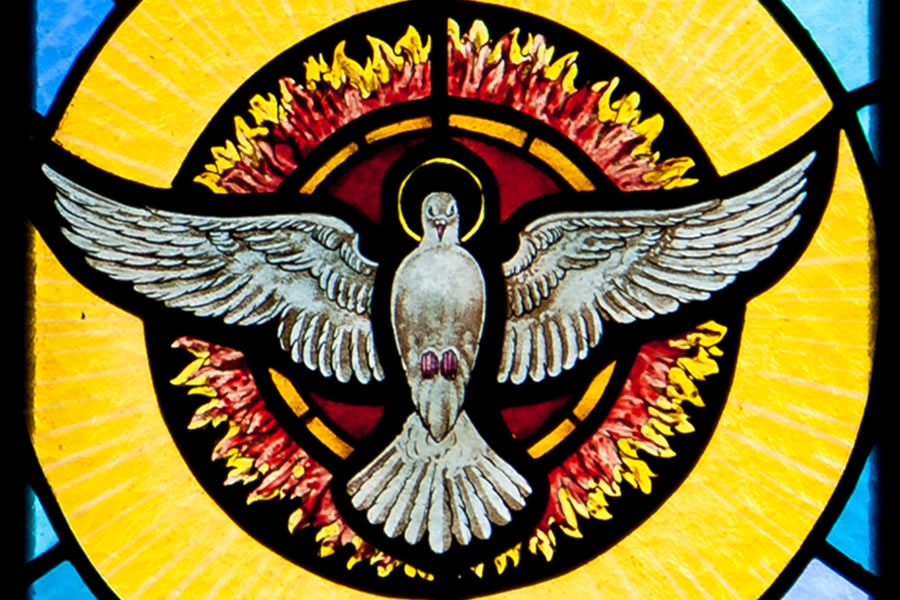St. Francis of Assisi Weekly Reflections

I Am With You Always
05-30-2021Weekly ReflectionWe Celebrate Worship Resource, Vol. 46, No. 2Matthew closes hid Gospel with Jesus’ final words to him and the other disciples before he ascended to heaven: “Go, therefore, and make disciples of all nations, baptizing them in the name of the Father, and of the Son, and of the Holy Spirit, teaching them to observe all that I have commanded you” (Matthew 28:19- 20). In one sentence, Jesus commissions them to do three things: make disciples, baptize, and teach. This commission is the commission of all subsequent disciples as well. Therefore, we too are called to make disciples, baptize, and teach. We do this in the name of all three person of the Trinity, assured of God’s presence with us. In the first chapter of the Gospel, Matthew referred to Jesus as Emmanuel, meaning “God is with us” (1:23). Now, as he closes his Gospel, Jesus says to his disciples, “I am with you always, until the end of the age” (28:20). God is with us always, and the gift of the Holy Spirit assures us of that. The Holy Spirit bears witness that we are children of God, brothers and sisters of Jesus Christ, adopted into God’s family. As Moses said generations earlier, “Did anything so great ever happen before?” (Deuteronomy 4:32).
How can you fulfill your commission as a disciple in your community, your workplace, your family?
Yo Estaré Con Ustedes Siempre
Mateo cierra su Evangelio con las últimas palabras de Jesús para él y los otros discípulos antes de ascender al cielo: “Id, pues, y haced discípulos a todas las naciones, bautizándolos en el nombre del Padre y del Hijo y del Espíritu Santo, enseñándoles a guardar todo lo que os he mandado” (Mateo 28:19-20 ). En una oración, Jesús les encarga hacer tres cosas: hacer discípulos, bautizar y enseñar. Esta comisión también es la comisión de todos los discípulos posteriores. Por eso, también nosotros estamos llamados a hacer discípulos, bautizar y enseñar. Hacemos esto en nombre de las tres personas de la Trinidad, seguros de la presencia de Dios con nosotros. En el primer capítulo del Evangelio, Mateo se refirió a Jesús como Emmanuel, que significa “Dios está con nosotros” (1:23). Ahora, al cerrar su Evangelio, Jesús dice a sus discípulos: “Yo estaré con ustedes siempre, hasta el fin de los tiempos” (28:20). Dios está con nosotros siempre y el don del Espíritu Santo nos lo asegura. El Espíritu Santo da testimonio de que somos hijos de Dios, hermanos y hermanas de Jesucristo, adoptados en la familia de Dios. Como dijo Moisés generaciones antes, “¿Ha sucedido algo tan grandioso antes?” (Deuteronomio 4:32).
¿Cómo puedes cumplir con tu comisión como discípulo en tu comunidad, en tu lugar de trabajo, en tu familia?
Pentecost Sunday
05-23-2021Question of the WeekReading I: Acts 2:1-11 - Descent of the Holy Spirit
Reading II: Galatians 5:16-25 - Live by the Spirit
Gospel: John 15:26-27; 16:12-15 - The Spirit of Truth
Key Passage: And they were all filled with the Holy Spirit and began to speak in different tongues (Acts 2:4)
Adults: When have you felt filled with the Spirit and emboldened to act with courage?
Kids: When have you felt strength from outside of yourself to do what was right?
Domingo de Pentecosés
Lectura I: Hechos 2: 1-11 - Descenso del Espíritu Santo
Lectura II: Gálatas 5: 16-25 - Vive por el Espíritu
Evangelio: Juan 15: 26-27; 16: 12-15 - El Espíritu de la Verdad
Pasaje Clave: Se llenaron del Espíritu Santo y empezaron a hablar en otros idiomas. (Hechos 2:4)
Adultos: ¿Cuándo te has sentido lleno del Espíritu y envalentonado para actuar con valentía?
Niños: ¿Cuándo has sentido fuerza desde fuera de ti mismo para hacer lo correcto?

Spirit Guide Me
05-23-2021Weekly ReflectionWe Celebrate Worship Resource, Vol. 46, No. 2When the apostles received the Holy Spirit, they immediately began to speak in different tongues, enabling people from every nation to hear and understand them in their own language. In the Vigil readings, the story of the tower of Babel was proclaimed. People scattered from Babel after they could no longer understand each other. In the world today, it often doesn’t even take different languages for people to fail to understand each other. We can be people of Babel, taking refuge in our isolated towers, refusing to hear the words of those who don’t agree with us, who don’t think like we do, who don’t understand “where we’re coming from.” But none of us come from Babel. We may come from different families, different neighborhoods, different cultures, different nations, different worlds. But the Holy Spirit draws us together and enables us to understand each other, as in Jerusalem at the first Pentecost. The Holy Spirit, the Spirit of truth, as Jesus testified, the Spirit who is manifested in each of us for some benefit, as Paul wrote, enables us to bridge divisions. The Spirit calls us to dialogue, to listen, in Spirit and in truth, in the Spirit of truth, and become truly one in body. A mighty act of God, indeed.
How will you reach out to someone different, in Spirit and in truth, to seek understanding?
Guíame Espíritu
Cuando los apóstoles recibieron el Espíritu Santo, inmediatamente comenzaron a hablar en diferentes lenguas, lo que permitió a personas de todas las naciones escucharlos y comprenderlos en su propio idioma. En las lecturas de la Vigilia, se proclamó la historia de la torre de Babel. La gente se dispersó de Babel después de que ya no podían entenderse. En el mundo de hoy, a menudo ni siquiera se necesitan diferentes idiomas para que las personas no se entiendan entre sí. Podemos ser gente de Babel, refugiándonos en nuestras torres aisladas, negándonos a escuchar las palabras de quienes no están de acuerdo con nosotros, que no piensan como nosotros, que no entienden “de dónde venimos”. Pero ninguno de nosotros venimos de Babel. Podemos provenir de diferentes familias, diferentes vecindarios, diferentes culturas, diferentes naciones, diferentes mundos. Pero el Espíritu Santo nos une y nos permite entendernos, como en Jerusalén en el primer Pentecostés. El Espíritu Santo, el Espíritu de verdad, como testificó Jesús, el Espíritu que se manifiesta en cada uno de nosotros para algún beneficio, como escribió Pablo, nos capacita para salvar las divisiones. El Espíritu nos llama al diálogo, a escuchar, en Espíritu y en verdad, en el Espíritu de verdad, y convertirnos verdaderamente en uno en cuerpo. De hecho, un gran acto de Dios.
¿Cómo te acercarías a alguien diferente, en Espíritu y en verdad, para buscar entendimiento?

We are Called to be Doers
05-16-2021Weekly ReflectionWe Celebrate Worship Resource, Vol. 46, No. 2Are you a doer or just an observer? The first disciples had plenty of opportunities to observe Jesus as he preached, taught, healed, and drove out demons. His ascension to his Father in heaven was certainly a sight to see as well. But Jesus never told the disciples, “Just sit back and watch.” No, Jesus sent the disciples forth to cure the sick, drive out demons, and announce the coming of the kingdom of God. Today we hear the disciples being asked why they are standing around looking at the sky. After all, the last words Jesus said before being lifted up were, “But you will receive power when the Holy Spirit comes upon you, and you will be my witnesses...to the ends of the earth” (Acts 1:8). Earlier, Jesus called on them to “Go into the whole world and proclaim the gospel” (Mark 16:15). Disciples are called to be doers, not watchers. We are called to be doers. The Holy Spirit came upon us in baptism, so we already have the power. In the second reading, Paul refers to the collection of all who believe, the church, as the body of Christ. We are the body of Christ. More than that, we are Christ’s hands in this world, feeding the hungry, clothing the naked, housing the homeless, rescuing the lost, working for justice and peace. Doing.
What will you do as a disciple?
Nosotros estamos llamados a ser Hacedores
Eres un hacedor o simplemente un observador? Los primeros discípulos tuvieron muchas oportunidades de observar a Jesús mientras predicaba, enseñaba, sanaba y expulsaba demonios. Su ascensión a su Padre en los cielos fue ciertamente un espectáculo digno de ver también. Pero Jesús nunca les dijo a los discípulos: “Siéntense y observen”. No, Jesús envió a los discípulos para sanar a los enfermos, expulsar demonios y anunciar la venida del reino de Dios. Hoy escuchamos a los discípulos que se les pregunta por qué están parados mirando al cielo. Después de todo, las últimas palabras que Jesús dijo antes de ser levantado fueron: “Pero cuando el Espíritu Santo descienda sobre ustedes, los llenará de fortaleza y serán mis testigos...hasta los últimos rincones de la tierra” (Hechos 1:8). Anteriormente, Jesús los llamó a “Id por todo el mundo y prediquen el evangelio” (Marcos 16:15). Los discípulos están llamados a ser hacedores, no vigilantes. Nosotros estamos llamados a ser hacedores. El Espíritu Santo vino sobre nosotros en el bautismo, así que ya tenemos el poder. En la segunda lectura, Pablo se refiere a la acumulación de todos los que creen, la iglesia, como el cuerpo de Cristo. Nosotros somos el cuerpo de Cristo. Más que eso, somos las manos de Cristo en este mundo, alimentando a los hambrientos, vistiendo a los desnudos, albergando a los desamparados, rescatando a los perdidos, trabajando por la justicia y la paz. Haciendo.
¿Qué harás tú como discípulo?
Ascension of the Lord
05-16-2021Question of the WeekReading I: Acts 1:1-11 - Jesus' Final Instructions and Ascension
Reading II: Ephesians 1:17-23 - The Church as Christ's Body
Gospel: Mark 16:15-20 - The Ascension
Key Passage: A spirit of wisdom and revelation. (Eph 1:17)
Adults: Who do you know who has passed away yet whose spirit is still alive and making an impact on others?
Kids: Who do you know in heaven? How might they still be helping us?
Ascensión del Señor
Lectura I: Hechos 1: 1-11- Instrucciones finales y ascensión de Jesús
Lectura II: Efesios 1: 17-23 - La Iglesia como cuerpo de Cristo
Evangelio: Marcos 16: 15-20 - La Ascensión
Pasaje Clave: Un espíritu de sabiduría y revelación (Efesios 1:17)
Adultos: ¿A quién conoces que haya fallecido y cuyo espíritu todavía esté vivo y tenga un impacto en los demás?
Niños: ¿A quién conoces en el cielo? ¿Cómo podrían seguir ayudándonos?

Love One Another as I Love You
05-09-2021Weekly ReflectionWe Celebrate Worship Resource, Vol. 46, No. 2With the word love appearing in today’s readings over a dozen times, it is tempting to imagine an idyllic scene with family and friends gathered together holding hands and telling each other how much they care for each other. But the love Jesus calls us to is a lot more challenging. After all, he said that the greatest love is the willingness “to lay down one’s life for one’s friends” (John 15:13). The very next day he did exactly that, but not just for his friends. He did it for everyone, everywhere, including generations of people who had not yet been born, including us. “Love one another as I love, you,” Jesus commanded (15:12). This is the selfless and unconditional love we are called to. We are to care for others as much as ourselves. This, he says, makes our joy complete. We live not just for ourselves, but for others: our parents, spouse, and children; our friends, neighbors, and acquaintances; the senior citizen in the nursing home, the prisoner serving a life sentence, the unborn baby in the womb, the family living in poverty on the other side of the tracks or halfway around the world. We are all God’s children, so we are all sisters and brothers, all worthy of our love.
How do you share the love God has for you with your brothers and sisters?
Amense Unos a los Otros Como los Amo Yo
Con la palabra amor apareciendo en las lecturas de hoy más de una docena de veces, es tentador imaginar una escena idílica con familiares y amigos reunidos tomados de la mano y diciéndose lo mucho que se quieren. Pero el amor al que Jesús nos llama es mucho más desafiante. Después de todo, dijo que el amor más grande es la disposición “a dar la vida por los amigos” (Juan 15:13). Al día siguiente hizo exactamente eso, pero no solo para sus amigos. Lo hizo por todos en todas partes, incluidas generaciones de personas que aún no habían nacido, incluidos nosotros. “Ámense los unos a los otros como yo lo he amado”, ordenó Jesús (15:12). Este es el amor desinteresado e incondicional al que estamos llamados. Debemos cuidar a los demás tanto como a nosotros mismos. Esto, dice él, completa nuestra alegría. Vivimos no solo para nosotros, sino para los demás: nuestros padres, cónyuge e hijos; nuestros amigos, vecinos y conocidos; el anciano en el hogar de ancianos, el preso que cumple cadena perpetua, el feto en el útero, la familia que vive en la pobreza al otro lado de las vías o al otro lado del mundo. Todos somos hijos de Dios, por lo que todos somos hermanos y hermanas, todos dignos de nuestro amor.
¿Cómo compartes el amor que Dios tiene por ti con tus hermanos y hermanas?
Love of Your Neighbor
05-09-2021Question of the WeekReading I: Acts 10:25-26, 34-35, 44-48 — Peter in Caesarea
Reading II: 1 John 4:7-10 - God's Love and Ours
Gospel: John 15:9-17 - A Disciple's Love
Key Passage:
“This is my commandment, that you love one another as I have loved you.” (John 15:12)
Adults: How is love of others connected to love for God?
Kids: Who needs Jesus' love this week? How can you show them his love?
Amor al Prójimo
Lectura I: Hechos 10:25-26, 34-35, 44-48 - Pedro en Cesarea
Lectura II: 1 Juan 4: 7-10 —El amor de Dios y el nuestro
Evangelio: Juan 15: 9-17 - El amor de un discípulo
Pasaje Clave:
“Este es mi mandamiento: que se amen los unos a los otros como yo los he amado.” (Juan 15:12)
Adultos: ¿Cómo se relaciona el amor a los demás con el amor a Dios?
Niños: ¿Quién necesita el amor de Jesús esta semana? ¿Cómo puedes mostrarles su amor?

You Have the Power to Bear Fruit
05-02-2021Weekly ReflectionWe Celebrate Worship Resource, Vol. 46, No. 2From Easter to Pentecost, each Sunday’s first reading is a passage from the Acts of the Apostles. The second part of Luke’s writings, Acts tells of the early Christian church, working to fulfill its mission to spread the gospel to all the world. It was not an easy task. Persecution, hardships, and disagreements often left the disciples dispirited and adrift. So if Christians from that time were to hear that “the church throughout all Judea, Galilee, and Samaria was at peace” (Acts 9:31), they might have concluded that their persecutors, such as Saul, who in the previous chapter of Acts was said to be dragging people out of their homes, so intent was he on destroying the church, had been defeated, or to use words from the Gospel, had been thrown into a fire and burned. But the Lord did not see Saul as irredeemable. While the first Christians reacted in fear, Jesus showed mercy. Jesus saw in Saul/Paul a person with the zeal and talent to spread the gospel to the ends of the earth, to bear fruit for the church. As Jesus remains in us and we remain on the true vine, we too are empowered to bear fruit in answering the call of spreading the Good News.
How do you bear fruit in your words and actions?
Tu Tienes el Poder de Dar Fruto
Desde Pascua hasta Pentecostés, la primera lectura de cada domingo es un pasaje de los Hechos de los Apóstoles. La segunda parte de los escritos de Lucas, Hechos, habla de la iglesia cristiana primitiva, trabajando para cumplir su misión de difundir el evangelio por todo el mundo. No fue una tarea fácil. La persecución, las dificultades y los desacuerdos a menudo dejaban a los discípulos desanimados y a la deriva. Entonces, si los cristianos de ese tiempo escucharan que “la iglesia en toda Judea, Galilea y Samaria estaba en paz” (Hechos 9:31), podrían haber concluido que sus perseguidores, como Saul, quien en el capítulo anterior de Hechos, decía que estaba arrastrando a la gente fuera de sus hogares, por lo que estaba decidido a destruir la iglesia, había sido derrotado o, para usar palabras del Evangelio, había sido arrojado al fuego y quemado. Pero el Señor no vio a Saul como irredimible. Mientras que los primeros cristianos reaccionaron con miedo, Jesús mostró misericordia. Jesús vio en Saul/Pablo a una persona con el celo y el talento para difundir el evangelio hasta los confines de la tierra, para dar fruto para la iglesia. Mientras Jesús permanece en nosotros y nosotros permanecemos en la vid verdadera, también nosotros tenemos el poder de dar fruto al responder al llamado de difundir las Buenas Nuevas.
¿Cómo fructificas en tus palabras y acciones?